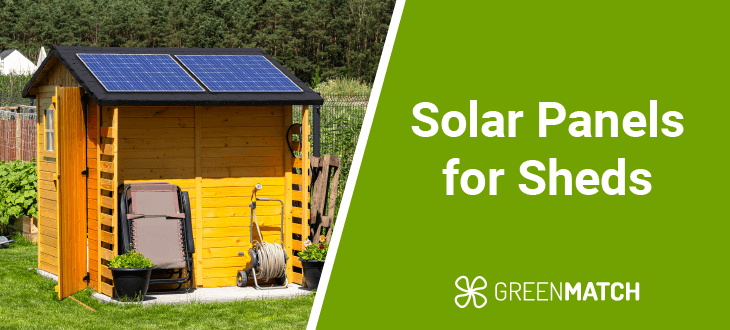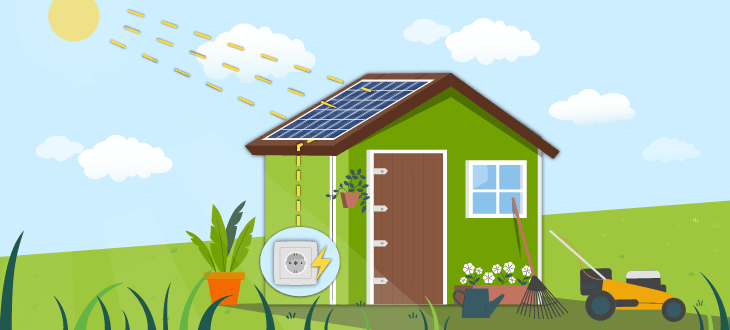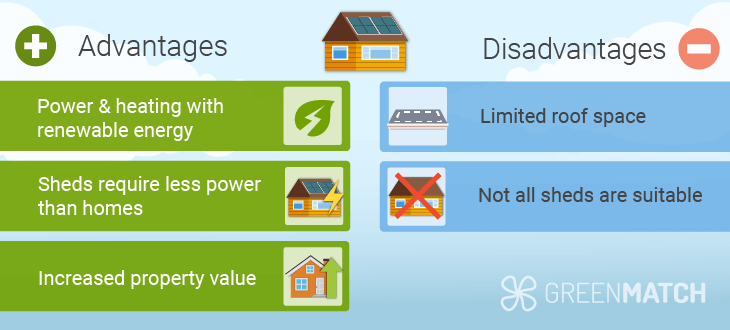Answer these simple questions and we will find you the BEST prices
Which type of solar quotes do you need?
It only takes 30 seconds
100% free with no obligation

Get up to 4 quotes by filling in only 1 quick form

Slash your energy bills by installing solar panels

For the average 2-3 bedroom house
- GreenMatch
- Solar Energy
- Solar Panels
- Solar Panels for Sheds
Solar Panels For Sheds: Costs, Pros + Cons in October 2025


- A 4m2 to 5m2 shed can potentially hold a 750W to 1kW solar panel system while a 12m2 shed can house a 3kW system.
- It can cost between £2,000 to £6,000 to install solar panels on a shed roof.
- If you have the right materials and space, most solar panels for sheds can power your lighting and shed appliances or provide a charging station for electric vehicles.
Putting solar panels on a shed roof can be a double-edged sword. While it provides electricity, most sheds may not be large enough for your solar panels to produce sufficient power but can still be handy.
Small sheds tend to be about 4m2 or 5m2, which is not enough space to power a home but could be a good addition to other solar panels or good for charging select appliances, while larger 10m2+ sheds can theoretically house enough panels to power a small 1 bedroom apartment.
Solar panels for garden shed power can also be implemented with solar arrays, but this page will mainly cover rooftop solar panels. If the following applications for smaller, shed-top solar panels interest you, let’s discuss the costs, pros, cons, and things to consider.
If you’re looking for solar panels for your shed, you will need the help of a reliable installer who can provide you with the best prices and the best services. Finding one can be a daunting task that takes days of research. Using our service, you can reduce the search process to a 30-second form and receive up to 4 free, non-binding solar quotes.
Click the button below to get started and you’ll receive the best prices in your area!
- Quotes from local engineers
- Payment by finance available
- Save up to £1,567 per year
It only takes 30 seconds



Can you put solar panels on your shed roof?

Yes. It is fairly easy to install solar panels on top of a shed. The main concern will be the space available and how solid the roof material is. Most shed roofs can fit 2 to 4 solar panels if they have between 4m2 to 5m2 to spare.
Roof materials like clay or concrete will require special mounting while some others like thatched and rubber roofs can potentially lead to lower efficiency. Thatched roofs in particular can also be a fire risk. Similarly, metal roofs reflect too much light, causing the panels to lose efficiency.
Depending on the structure of the roof, the panels may not mount correctly, which can increase the heat they absorb, causing problems with light absorption. The best roof types for solar panels include tile roofs, slate roofs, and asphalt shingles. Installers tend to know how to install panels on these materials since they are the most common.
If you have an unstable roof or inappropriate material, you may want to avoid putting panels on there since it can be an investment. In these cases, it may be preferable to put an array with ground mounted solar panels next to the shed. Another option is to replace the shed roof with solar roof tiles, which can be more expensive per kW but integrate onto the roof better.
That said, putting solar panels on a flat roof is fairly simple and provides sustainable energy for quite a few applications. While sheds may not have the roof space to power a full home, smaller solar panel systems can keep certain appliances running.
How many solar panels should you put on your garden shed?
How many solar panels you need and can fit on your shed roof will depend on the amount of free space you have. Sheds tend to have dimensions of a minimum of 1.2m x 1.8m to 2.4m x 3m. On average, they are 4m2 or 5m2, which could fit 2 solar panels allowing for 700W to 1kW of power. Typically, solar panels can range from 1.65m2 to 2m2.
Larger sheds can be 10m2 to 12m2 but these are rarer than smaller ones. It may be possible to fit a 1kW system but that will require a shed with about 10 square metres available which is quite large.
| Space available | Number of panels | Weight |
|---|---|---|
| 2m2 | 1 | 18-21kg |
| 4m2 | 2 | 36-42kg |
| 6m2 | 3 | 54-63kg |
| 8m2 | 4 | 72-84kg |
| 10m2 | 5 | 90-105kg |
| 12m2 | 6 | 108-126kg |
Many sheds don’t use any electricity at all but others have small appliances, light bulbs, tools, and sometimes even larger home appliances like refrigerators. By using multiple 450W panels, you can cover most appliances mentioned and even run a few of them together.
An eco-friendly solar panel shed roof system will probably take up 2m2 per panel. Solar panels can be smaller but we’re using a higher estimate to account for potentially large sizes and other factors like spacing between panels if weight distribution is required.
It’s also important to remember that solar panels on sheds are not the only option, as you can also have them on an array next to it (although this will require outdoor space instead of roof space).
Costs and savings of shed solar panels in the UK
Solar panel costs per panel can vary based on the brand, the size of solar panels you choose, and your energy needs. A 450W solar panel can cost between £300 and £600, which will generate 4.5kWh per day.
| Number of solar panels (450W) | Yearly output | Required space | Price (excl. installation costs) | Annual savings | Break even point |
|---|---|---|---|---|---|
| 1 | 540kWh | 2m2 | £300 - £600 | £36.5 - £40 | 8 to 20 years |
| 2 | 1,080kWh | 4m2 | £600 - £1200 | £72 - £80 | 8 to 18 years |
| 3 | 1,620kWh | 6m2 | £900 - £1,600 | £108 - £120 | 8 to 18 years |
Ordinarily, we recommend buying a full kilowatt (kW) system, however, since some sheds have minimal space, buying individual panels and connecting them could potentially be a better option. This accounts better for the size of the shed you are working with.
We also recommend considering whether to connect in series or parallel. The former maximises your output voltage while the latter is best for when you want to charge or use a larger amount of appliances together, which requires more amperage. Depending on how many devices you’ll be using, you may want to think about the potential power setup.
A trio of 450W solar panels can potentially serve the following purposes:
- Individual power tools such as drills, circular saws, and disc-sanders
- Power 16 to 18 LED light bulbs (100 Watt equivalent)
- A small fridge which can consume about 2.5kWh to 4kWh per day
A small set of shed or garden solar panels can be enough to suffice for some standard appliances. Sheds with solar panels can run these appliances together but that may not always be a good idea because energy generation can be lower depending on environmental factors.
The solar panel type you choose can also matter. Monocrystalline models are the best solar panels in the UK since they take up the least amount of space and have the best power output. With limited available roof space, you should make the most of it with the appropriate size, which is why we recommend 450W panels.
For larger sheds with more extensive needs, 2kW and 3kW systems might be needed. They take up more space but also offer more power, with a 3kW system being capable of powering a small home.
| Solar system size | System cost | Yearly output | Required space | Annual savings | Break-even |
|---|---|---|---|---|---|
| 1kW | £1,500 - £3,000 | 1,020kWh | 4m2 | £72+ | 8 - 20 years |
| 2kW | £3,800 - £4,600 | 1,700kWh | 8m2 | £783 | 7 |
| 3kW | £5,700 - £7,000 | 2,550kWh | 12m2 | £783 | 7 |
Solar panels can remain efficient for about 25 years before they start losing efficiency. With a break-even between 8 to 20 years, you can guarantee that you will recoup your investment within its lifespan, many years before losses in solar panel efficiency become noticeable. This can vary from brand to brand, which is why we recommend getting the most efficient solar panels.
These prices are on the lower end of solar installations than the average home. In comparison, a 4kW solar system with a battery can cost between £13,000 and £15,500.
Solar thermal panels can also be possible if you only need heating for your shed instead of free electricity. This can be a great option for solar heating for shed interiors but they are expensive, costing about £3,000 to £8,000.
If you need to know more about the prices of solar panels, it’s best to contact an installer. Finding a trustworthy one can save you a lot of time and money. However, finding one can take days of strenuous research and calling up companies on your own. That’s why our service can be a quicker, free alternative.
Click the button below and we’ll provide you with up to 4 free, non-binding quotes from reputable installers in your area.
- Quotes from local engineers
- Payment by finance available
- Save up to £1,567 per year
It only takes 30 seconds



Advantages and disadvantages of solar power for sheds

Pros:
- Power & heating with renewable energy: Shed solar panels could provide a solution that doesn’t rely on the electricity and gas grid.
- Sheds require less power than homes: Generally, a shed will be fine with a small number of solar panels, often used to charge some small appliances.
- Increased property value: A solar powered shed can increase property values without being attached to the main areas of the home.
Cons:
- Limited roof space: Sheds do not have the roof real estate that most homes have. This will automatically mean that your system will have less power.
- Not all sheds are suitable: Depending on the type of roof, your shed may not be ideal for solar generation. Solar powered sheds should ideally have tile, slate, or asphalt shingles as other materials and designs can decrease efficiency. Most sheds in the UK are made from asphalt, but this is not universally true.
Are solar panels on your shed worth it?
If you have adequate space (over 4m2) and proper positioning for your shed’s roof (south-facing roof with a 30° to 50° slope), solar panels can be a great choice. They can serve as a charging station for appliances while eliminating the need for an on-grid electric connection.
The size of your shed is a major consideration. A solar powered shed can generate enough energy to power most appliances if the roof can support a 1kW system or 3 different 450W panels. Even with 2 400W panels, it could power a decent living room with a fridge and some appliances.
So, should you buy solar panels for your shed? They can be a great option assuming you have adequate space, the roof of the shed faces southward, and you have panels that are powerful enough. Shed solar power is especially useful if you want to power a few appliances or tools without connecting an electric power line to an external facility, which can be expensive for some properties.
For individual panels, a 450W to 500W output is ideal as a solar panel for garden sheds since sheds tend to have limited roof space. For solar panel systems, 1kW and 2kW systems could also be a great option and will charge most appliances.
Solar panels today are also far cheaper compared to a decade ago. Aside from that, certain government grants and incentives could allow the average UK consumer to procure free solar panels.
If you’re looking to install solar panels for home or shed applications, you will still need to find an installer. A good installer can provide you with the best prices and make sure the job is done right. That’s why we provide a network of professionals that we have personally vetted.
All you have to do is fill out a 30-second form and we’ll find the best ones in your area, providing you with up to 4 free, non-binding quotes. Click the button below to get started.
- Quotes from local engineers
- Payment by finance available
- Save up to £1,567 per year
It only takes 30 seconds



FAQ
If you have the appropriate roof space (more than 4m2) or want to charge a small number of appliances, a solar panel system can be a great addition to a shed. You should properly assess your roof material before installing one.
750W to 1kW systems can be sufficient to run all the appliances in a shed. However, this would require adequate roof space on your shed while being fairly cheap compared to a full home system.
While this can vary from region to region, you generally don’t need planning permission to install solar panels on your shed. You should, however, make sure the shed has the appropriate size and position for solar panels.
Yes. Aside from powering electric heating with regular solar panels, you can also connect solar thermal panels. Solar panels can lead to significant savings for your home.

Rawal Ahmed is a writer at GreenMatch with an interest in sustainability and a background in tech journalism and digital marketing.
We strive to connect our customers with the right product and supplier. Would you like to be part of GreenMatch?

Stay up to date with energy saving tips and grant alerts
Receive offers, marketing and promotions via email from Leads.io about GreenMatch and our brands/partners to help you save.
Thank you for subscribing to our newsletter!
Your email has been successfully added to our list. We look forward to sharing our latest updates with you soon!
